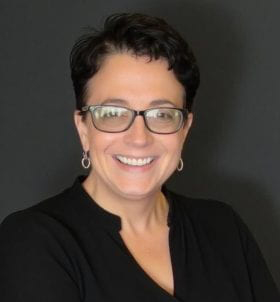Melissa Rockwell-Hopkins, EdD, provides interim leadership and oversight for Danforth Facilities Planning & Management teams in addition to her current responsibilities as Associate Vice Chancellor and Associate Dean for Operations and Facilities Management at the School of Medicine. In this her interim role, she is charged with ensuring consistency in operations, services, planning, governance, and capital planning across both campuses.
Under Dr. Rockwell-Hopkins leadership, WashU Medicine has more than doubled in size, now encompassing 12.2 million gross square feet across 65 buildings. She oversees a team of 725 employees and 125 contracted professionals, managing an annual operating budget exceeding $80 million and a capital portfolio of more than $1 billion. Her responsibilities at WashU Medicine include campus, space and capital planning, design, and construction; facilities and utilities operations; custodial and support services; protective services and emergency management; real estate and leasing; transportation and parking, campus programs, mail and receiving, enterprise technology for physical systems and project delivery, shared event and education spaces, food service, housing, retail services, and strategic programs that advance sustainability, organizational culture, workforce engagement and community connections.
She has led many of the school’s most transformative initiatives. Among them are the Jeffrey T. Fort Neuroscience Research Building, a 619,000-square-foot facility on track for LEED Gold and recognized for its commitment to diversity, equity, inclusion, and sustainable design; the 160,000-square-foot vertical expansion of the Steven and Susan Lipstein BJC Institute of Health, which includes advanced BSL-3 research suites; and the award-winning Central West End MetroLink Station redesign, enhancing accessibility and pedestrian safety across the campus.
She also oversaw development of the Mid Campus Center, a 12-story, 510,000-square-foot administrative hub that unites key university offices, advancing collaboration and efficiency across academic, research, and clinical missions. The building achieved LEED Gold certification and serves as a model for sustainable workplace design. Additionally, she directed the construction of the Gary C. Werths Building at Siteman Cancer Center. This advanced clinical and research facility enhances interdisciplinary collaboration and supports patient-centered innovation in oncology.
Her portfolio also includes a new Child Development Center on the medical campus, a $17 million project that expanded capacity to support employees and their families, and the launch of the Staff Climate and Culture Initiative, which she chairs, to strengthen engagement and belonging across the organization.
A cornerstone of Melissa’s leadership is collaboration. She works closely with program leaders, department chairs, and business managers, emphasizing that progress depends on shared purpose and partnership. Her work extends beyond the School of Medicine, aligning efforts with university administration, hospital partners, and the surrounding community to ensure that every project advances the university’s mission and enhances the well-being of those it serves. Melissa also serves as a board member of the Washington University Medical Center Redevelopment Corporation, guiding neighborhood redevelopment and community partnerships.
Melissa is a strong advocate for mental health awareness and empathy-based leadership, inspired by her experience of losing a child to suicide in 2008. She actively supports the American Foundation for Suicide Prevention (AFSP) and its mission to save lives and bring hope to those affected by suicide. This experience deepened her commitment to creating environments where people feel seen, supported and safe, values that now guide her leadership philosophy and the School of Medicine’s Climate and Culture Initiative.
She believes that mental health awareness, empathy, collaboration, and inclusion are essential to a healthy, high-performing organization. By fostering psychological safety, open communication and shared accountability, she champions a team-based culture rooted in respect and trust. Her approach reflects a deep understanding that the wellness of people and the stewardship of place are inseparable and fundamental to institutional excellence.
With more than 35 years of leadership experience in higher education, health care, and public-sector operations, she previously held leadership roles at the University of Houston, The Ohio State University, and CH2M HILL. She has a doctorate of education in organizational change from Baylor University, a master’s in human resources management, a master’s in nonprofit management from Washington University in St. Louis and a bachelor’s degree in law and justice from Central Washington University.
Through her leadership, Melissa continues to build a culture of excellence, equity, sustainability, collaboration and innovation that advances Washington University’s mission to improve human health through discovery, education and care.
